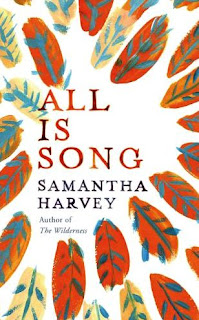10.29.2012
All is Song
And philosophy was the pure song, the purest of songs, heard only with training, and hanging at a pitch outside of the common range. Samantha Harvey
Samantha Harvey invites a reader to consider several issues throughout her philosophical novel, All is Song—the power of brotherly love, the choice between questioning and conforming, and the pervasiveness of anti-intellectualism in society.
Not everyone likes this kind of novel. One reviewer found the writing “labored.” Another commented on the “overwhelming beauty of the prose.” So much for critical reviews.
Leonard Deppling returns to London after the end of his marriage and caring for his dying father. He has come to join his brother, William, a former lecturer and activist. Leonard seeks to understand why William never visited his ailing father or attended his funeral. He moves in with William’s wife and three children.
William is a thoroughly unconventional man, unworldly, and forever questioning. What? How? Why? He is a modern version of Socrates, walking about the neighborhoods of London, talking informally with young people, and gathering quite a dedicated group of followers. He says,
…to my mind, far from being arrogant, asking questions is the most humble thing a person can do. And my freedom isn’t a reward if it’s at the expense of reason and honesty.
Imagine being with such a person, a person who never ceases to question what you say never assuming he understands what you said, or that you understood it either. He takes the simplest thing you say and breaks it down into little linguistic puzzles. What do you mean by this? The word has several meanings. I am not sure what you meant by this. William says,
“The problem is that you’ve used a lot of ideas in that sentence I can’t even begin to understand. The just, the good, the natural.” Leonard gathers himself together and says, “Allow me a sentence free of charge sometimes; allow me that, yes? William replies, “I won’t do anything without proper thought.”
Finally, one of William’s young followers, Stephen, commits a crime that for any serious reader is one of the worst imaginable. Stephen flees the country and because of the close association of the two men, William is implicated in the crime.
Recall what happened to Socrates when he was accused of corrupting the youth of Athens. William acts similarly during his trial as an accessory to the crime. He says, “I’d rather share below room in a prison cells than give away a millimeter of space in my mind.”
Harvey’s novel is a philosophical work of fiction par excellence. If you like reading novels of ideas that probe relentlessly into debate about morality, religion, existence, friendship and obligations to the persons you love, you’ll enjoy All is Song.
In spite of William’s questioning and the spiraling inquiry this usually led to, nothing he could say or do had slightest effect on the deep bond between the two brothers. The kindness and love between them remained in tact.
I see kindness at times among all the bullshit, and I see love.
Labels:
All is Song,
Philosophical Novel,
Samantha Harvey
Subscribe to:
Comments (Atom)

